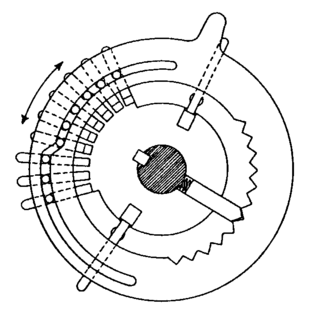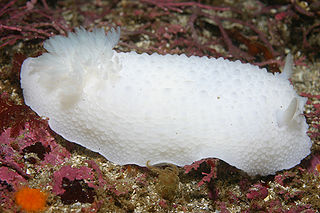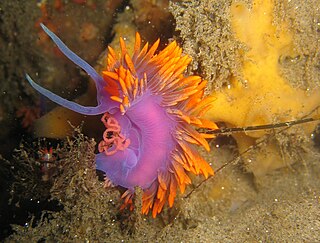
Digenea is a class of trematodes in the Platyhelminthes phylum, consisting of parasitic flatworms with a syncytial tegument and, usually, two suckers, one ventral and one oral. Adults commonly live within the digestive tract, but occur throughout the organ systems of all classes of vertebrates. Once thought to be related to the Monogenea, it is now recognised that they are closest to the Aspidogastrea and that the Monogenea are more closely allied with the Cestoda. Around 6,000 species have been described to date.

Willgodt Theophil Odhner was a Swedish engineer and entrepreneur, working in St. Petersburg, Russia. He was the inventor of the Odhner Arithmometer, which by the 1940s was one of the most popular type of portable mechanical calculator in the world.

A pinwheel calculator is a class of mechanical calculator described as early as 1685, and popular in the 19th and 20th century, calculating via wheels whose number of teeth were adjustable. These wheels, also called pinwheels, could be set by using a side lever which could expose anywhere from 0 to 9 teeth, and therefore when coupled to a counter they could, at each rotation, add a number from 0 to 9 to the result. By linking these wheels with carry mechanisms a new kind of calculator engine was invented. Turn the wheels one way and one performs an addition, the other way a subtraction.

The Solenogastres, common name the solenogasters, are one class of small, worm-like, shell-less molluscs (Aplacophora), the other class being the Caudofoveata (Chaetodermomorpha).
Nils Hjalmar Odhner was a Swedish zoologist who studied mollusks, a malacologist. He was professor of invertebrate zoology at the Swedish Museum of Natural History, Stockholm, and a member of the Royal Swedish Academy of Sciences.

Doridoidea, commonly known as dorid nudibranchs, are a taxonomic superfamily of medium to large, shell-less sea slugs, marine gastropod mollusks in the clade Doridacea, included in the clade Nudibranchia.

The Polyceridae are a taxonomic family of sea slugs, dorid nudibranchs, marine gastropod mollusks within the superfamily Polyceroidea.

Chromodorididae, or chromodorids, are a taxonomic family of colourful sea slugs; dorid nudibranchs, marine gastropod mollusks in the superfamily Doridoidea. “Chromodorid nudibranchs are among the most gorgeously coloured of all animals.” The over 360 described species are primarily found in tropical and subtropical waters, as members of coral reef communities, specifically associated with their sponge prey. The chromodorids are the most speciose family of opisthobranchs. They range in size from <10mm to over 30 cm, although most species are approximately 15–30 mm in size.

Chamidae, common name the jewel boxes or jewel box clams, is a family of marine bivalve mollusks in the order Venerida.

Ellobiidae, common name the hollow-shelled snails, is a family of small air-breathing land, marine, and brackish snails; pulmonate gastropod mollusks in the clade Eupulmonata. Ellobiidae is the only family in the superfamily Ellobioidea, according to the taxonomy of the Gastropoda by Bouchet & Rocroi, 2005).

Plagiorchiida is a large order of trematodes, synonymous to Echinostomida. They belong to the Digenea, a large subclass of flukes. This order contains relatively few significant parasites of humans.

Echinostomata is a suborder of the parasitic flatworm order Plagiorchiida. The suborder contains numerous species that are parasitic in humans.

Cadlina is a genus of sea slugs, dorid nudibranchs, shell-less marine gastropod mollusks historically classified in the family Chromodorididae. Recent research by R.F. Johnson in 2011 has shown that Cadlina does not belong to the family Chromodorididae. She has therefore brought back the name Cadlinidae from synonymy with Chromodorididae. The family Cadlinidae also includes the genus AldisaBergh, 1878.

The Aeolidida is a taxonomic clade of sea slugs, specifically aeolid nudibranchs, marine gastropod molluscs in the clade Cladobranchia. They are distinguished from other nudibranchs by their possession of cerata containing cnidosacs.

Fionoidea is a superfamily of small sea slugs, aeolid nudibranchs. They are gastropod mollusks within the infraorder Cladobranchia. The families within Fionoidea were shown to be monophyletic on DNA evidence and a re-interpretation of family characteristics was provided.
Curnonidae is a small family of sea slugs, nudibranchs, shell-less marine gastropod molluscs, in the clade Euthyneura.

The Odhner Arithmometer was a very successful pinwheel calculator invented in Russia in 1873 by W. T. Odhner, a Swedish immigrant. Its industrial production officially started in 1890 in Odhner's Saint Petersburg workshop. Even though the machine was very popular, the production only lasted thirty years until the factory was nationalised and closed down during the Russian revolution of 1917.
Simrothiella is a genus of solenogasters, shell-less, worm-like, marine mollusks.

Antalis is a genus of tusk shells, marine scaphopod mollusks.

Zeradina is a genus of gastropods belonging to the family Vanikoridae.
















